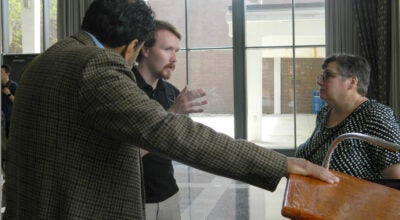Aymer leaving Hood Seminary on June 30
Published 12:00 am Saturday, April 6, 2013
SALISBURY — After guiding Hood Theological through accreditation and growing its enrollment by nearly 10 times, Dr. Albert J.D. Aymer is retiring.
Aymer announced to his Board of Trustees two years ago that he planned to retire from the presidency in June 2013. He has spent 19 years working at the school.
“One of the concerns I picked up from members of the Board of Trustees — they became concerned as to what would happen to the seminary if I suddenly collapsed and dropped dead,” Aymer said. With just a hint of a smile, he added, “I took that as a cue to mean it was time to pack up and go.”
Aymer said he had never thought about what would happen to Hood when he was gone, so he and the board started to work on a transition plan. Dr. Vergel Lattimore was hired in July 2012 as the graduate school’s first vice president of academic affairs. Aymer plans to leave on June 30, so the Board of Trustees will name a president-elect earlier that month.
Before officially retiring as president in June 2014, Aymer will take a one-year sabbatical, which he has never done before. Even after his retirement, he plans to continue his professorship, which he said is his favorite part of working at the seminary.
“You know what I love to do most? To teach,” Aymer said. “At heart, I’m a preacher and a teacher.”
ggg
A native of Antigua, Aymer was raised in the British Methodist Church and became a member of the United Methodist Church when he came to the United States to pursue further studies. He served as senior pastor at Morristown United Methodist Church in Morristown, N.J., before coming to Salisbury in 1994.
Development Officer Margaret Kluttz said she has been at Hood for a little more than three years, but she has known Aymer since he moved to Salisbury.
“What he’s been accomplishing and doing over the last 18 or 19 years is just incredible,” she said. “It’s almost like I have the opportunity to be going to school every day while working side by side with Albert Aymer. It’s such a unique experience.”
Aymer said he would prefer to just slip away quietly, without much fanfare, recognition or newspaper coverage.
But the Board of Trustees, students, alumni and friends have planned a week of events May 8-13 to honor Aymer and have a little fun with him. Some of these will be known to him, and others will be a surprise.
The highlight of the week is the actual graduation ceremony on May 11. The Board of Trustees also plans to have a tribute to Aymer at the annual Bishop James Walker Hood Dinner to be held on May 9 in Lewis Hall at the First Presbyterian Church.
Bishop Richard K. Thompson, chairman of the Board of Trustees, said the board is sad to lose Aymer but “rejoicing in his retirement,” because it is well deserved.
“He’s been a good administrator, he’s been good role model and he’s been a good person for Hood seminary,” said Bishop Richard K. Thompson, chairman of the Board of Trustees. “I often like to refer to him as Hood seminary’s Moses, because he has brought it from a mighty long way.”
ggg
When Aymer first arrived at Hood as its dean in 1994, it was part of Livingstone College and was not an accredited institution.
In 2001, after its enrollment grew from 30 students to 200, Hood Theological Seminary became an accredited independent seminary and separated from Livingstone. Aymer was named as the first president.
“Livingstone’s level of accreditation would not allow us to do a doctoral degree program if we remained part of Livingstone College,” Aymer said. “That meant we had to gain independence.”
To enable Hood to earn accreditation, he created a new curriculum for the school based on curricula at three other seminaries. Those included Drew University — where Aymer worked as an associate dean for 12 years — Duke University and Yale University.
Aymer said this process was the most challenging part of his time as president (though he called the split from Livingstone the “hardest”). He not only had to come up with a new curriculum but also had to find instructors to teach it.
But his work paid off, and Hood is now accredited by the Commission on Accrediting of the Association of Theological Schools in the United States and Canada. It is approved for two master’s degree programs and a doctoral degree program.
Hood is also approved for the preparation of United Methodist clergy by the University Senate of the United Methodist Church and is the only theological seminary in the U.S. sponsored by the African Methodist Episcopal Zion Church.
Aymer said that accomplishment “threw the doors of the school wide open,” bringing in a larger and more diverse student body. Now, he said, people of up to 17 denominations could be at the school at any given time, and it is often praised for its racial diversity.
Whoever becomes Hood’s next president will be starting under much better circumstances than Aymer did.
In addition to teaching, Aymer said he’d also like to do some writing once he steps down as president. He may even collaborate with his daughter, who is a New Testament scholar just like he is. No matter where his life goes from here, he said he just wants to follow and praise God.
“He has called me since I was in my teens,” Aymer said. “From that point I said ‘yes’ to him, I have said, ‘Use me however you want, Lord.’ It’s been a good journey.”
Contact reporter Karissa Minn at 704-797-4222.
Twitter: twitter.com/posteducation
Facebook: facebook.com/Karissa.SalisburyPost


